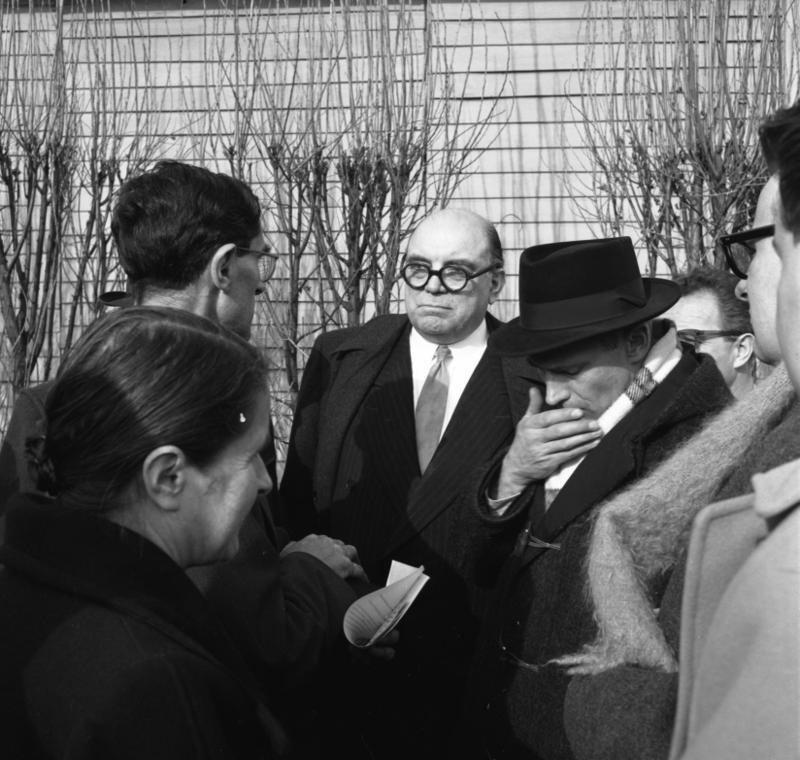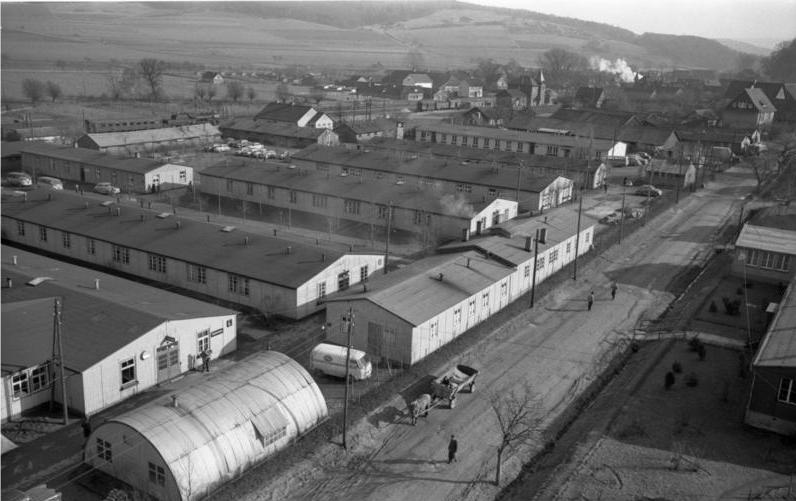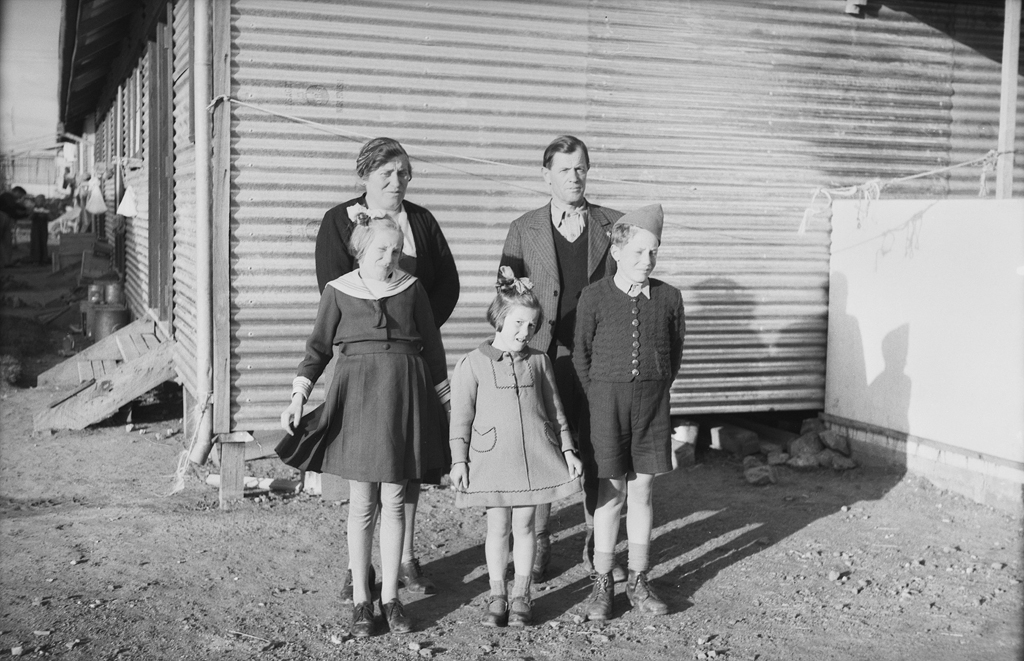|
Sefton Delmer
Denis Sefton Delmer (24 May 1904, Berlin, Germany – 4 September 1979, Lamarsh, Essex) was a British journalist of Australian heritage and propagandist for the British government during the Second World War. Fluent in German, he became friendly with Ernst Röhm, who arranged for him to interview Adolf Hitler in 1931. During the war, he led a black propaganda campaign against Hitler by radio from England. It was so successful that Delmer was named in the Nazis' Black Book for immediate arrest after their planned invasion of Britain. Early life Denis Sefton Delmer, known familiarly as "Tom", was born in Berlin as a British subject, as a son of Jewish Australian parents living in Germany. His father, Frederick Sefton Delmer, was British of Australian heritage, born in Hobart, Tasmania, who became Professor of English Literature at Berlin University and author of a standard textbook for German schools. On the outbreak of the First World War his father was interned in Ruhlebe ... [...More Info...] [...Related Items...] OR: [Wikipedia] [Google] [Baidu] |
Friedland, Lower Saxony
Friedland is a municipality in the district of Göttingen, in Lower Saxony, Germany. It is situated on the river Leine, approx. 13 km south of Göttingen. Its seat is in the village of Groß Schneen, one of fourteen communities in the municipality. The others are Friedland proper, Ballenhausen, Deiderode, Elkershausen, Klein Schneen, Lichtenhagen, Ludolfshausen, Mollenfelde, Niedergandern, Niedernjesa, Reckershausen, Reiffenhausen and Stockhausen. Friedland Refugee Camp In September 1945, the Control Commission for Germany - British Element (CCG/BE) built a camp in Friedland, near the American (Hesse) and Soviet occupation (Thuringia) zones. The camp was designed as the first way station for refugees, evacuees, and returning soldiers. Starting in 1947, the camp was administered by the federal state of Lower Saxony. During the period of mass expulsions from 1944 to 1945, the camp offered services to large waves of refugees. Thereafter, it functioned primarily as a way station ... [...More Info...] [...Related Items...] OR: [Wikipedia] [Google] [Baidu] |
Frederick Sefton Delmer
Frederick Sefton Delmer (24 October 1864 – 7 April 1931) was an Australian linguistics university lecturer and journalist. Life He was born in Battery Point, Tasmania, to James Delmer (1837–1914) and Margaret Sefton Burgess (1837–1886). Delmer studied at Trinity College of the University of Melbourne and continued his studies in Europe, where he made the acquaintance of Herman Grimm, son of Wilhelm Grimm. After his return to Australia, he was a teacher in 1896, but also wrote travel reports. He soon returned to Europe where he became a lecturer at the University of Königsberg in 1900 and, from 1901 to 1914, he was a lecturer at the Friedrich-Wilhelms-Universität in Berlin. He married Isabella Mabel Hook (1879–1938) in 1901. They had a son, Sefton Delmer, and a daughter, Margaret Mabel Sefton Delmer (1905–1990). In 1910, he published the book ''English Literature from Beowulf to Bernard Shaw'', which was, for decades, a standard work for English lessons in German s ... [...More Info...] [...Related Items...] OR: [Wikipedia] [Google] [Baidu] |
Führer
( ; , spelled or ''Fuhrer'' when the umlaut is not available) is a German word meaning " leader" or " guide". As a political title, it is strongly associated with the Nazi dictator Adolf Hitler. Nazi Germany cultivated the ("leader principle"), and Hitler was generally known as just ("the Leader"). In compound words, the use of "" remains common in German and is used in words such as ( mountain guide) or (leader of the opposition). However, because of its strong association with Hitler, the isolated word itself usually has negative connotations when used with the meaning of "leader", especially in political contexts. The word has cognates in the Scandinavian languages, spelled '' fører'' in Danish and Norwegian, which have the same meaning and use as the German word, but without necessarily having political connotations. In Swedish, '' förare'' normally means "driver" (of a vehicle). However, in the compound word '' härförare'', that part does mean "leader", ... [...More Info...] [...Related Items...] OR: [Wikipedia] [Google] [Baidu] |
German Federal Election, November 1932
Federal elections were held in Germany on 6 November 1932.Dieter Nohlen & Philip Stöver (2010) ''Elections in Europe: A data handbook'', p762 The Nazi Party saw its vote share fall by four percentage points, while there were slight increases for the Communist Party of Germany and the national conservative German National People's Party. The results were a great disappointment for the Nazis, who lost 34 seats and again failed to form a coalition government in the Reichstag. The elections were the last free and fair all-German election before the Nazi seizure of power in 1933. Background Previously Chancellor Franz von Papen, a former member of the Catholic Centre Party, had governed without parliamentary support by relying on legislative decrees promulgated by President Paul von Hindenburg under Article 48 of the Weimar Constitution. However, on 12 September 1932 Papen had to ask Hindenburg to dissolve parliament in order to pre-empt a motion of no confidence introduced by the ... [...More Info...] [...Related Items...] OR: [Wikipedia] [Google] [Baidu] |
United Kingdom
The United Kingdom of Great Britain and Northern Ireland, commonly known as the United Kingdom (UK) or Britain, is a country in Europe, off the north-western coast of the European mainland, continental mainland. It comprises England, Scotland, Wales and Northern Ireland. The United Kingdom includes the island of Great Britain, the north-eastern part of the island of Ireland, and many List of islands of the United Kingdom, smaller islands within the British Isles. Northern Ireland shares Republic of Ireland–United Kingdom border, a land border with the Republic of Ireland; otherwise, the United Kingdom is surrounded by the Atlantic Ocean, the North Sea, the English Channel, the Celtic Sea and the Irish Sea. The total area of the United Kingdom is , with an estimated 2020 population of more than 67 million people. The United Kingdom has evolved from a series of annexations, unions and separations of constituent countries over several hundred years. The Treaty of Union between ... [...More Info...] [...Related Items...] OR: [Wikipedia] [Google] [Baidu] |
Daily Express
The ''Daily Express'' is a national daily United Kingdom middle-market newspaper printed in tabloid (newspaper format), tabloid format. Published in London, it is the flagship of Express Newspapers, owned by publisher Reach plc. It was first published as a broadsheet in 1900 by Sir Arthur Pearson, 1st Baronet, Sir Arthur Pearson. Its sister paper, the ''Sunday Express'', was launched in 1918. In June 2022, it had an average daily circulation of 201,608. The paper rose to become the largest circulation newspaper in the world under Max Aitken, Lord Beaverbrook, going from 2 million in the 1930s to 4 million in the 1940s. It was acquired by Richard Desmond's company Northern & Shell in 2000. Hugh Whittow was the editor from February 2011 until he retired in March 2018. In February 2018 Trinity Mirror acquired the ''Daily Express'', and other publishing assets of Northern & Shell, in a deal worth £126.7 million. To coincide with the purchase the Trinity Mirror group changed ... [...More Info...] [...Related Items...] OR: [Wikipedia] [Google] [Baidu] |
Reichstagsbrand
The Reichstag fire (german: Reichstagsbrand, ) was an arson attack on the Reichstag building, home of the German parliament in Berlin, on Monday 27 February 1933, precisely four weeks after Nazi leader Adolf Hitler was sworn in as Chancellor of Germany. Marinus van der Lubbe, a Dutch "council communist", was the apparent culprit; however, Hitler attributed the fire to Communist agitators. He used it as a pretext to claim that Communists were plotting against the German government, and induced President Paul von Hindenburg to issue the Reichstag Fire Decree suspending civil liberties, and pursue a "ruthless confrontation" with the Communists. This made the fire pivotal in the establishment of Nazi Germany. The first report of the fire came shortly after 9:00p.m., when a Berlin fire station received an alarm call. By the time police and firefighters arrived, the Chamber of Deputies (the lower house) was engulfed in flames. The police conducted a thorough search inside the ... [...More Info...] [...Related Items...] OR: [Wikipedia] [Google] [Baidu] |
Oxford Dictionary Of National Biography
The ''Dictionary of National Biography'' (''DNB'') is a standard work of reference on notable figures from British history, published since 1885. The updated ''Oxford Dictionary of National Biography'' (''ODNB'') was published on 23 September 2004 in 60 volumes and online, with 50,113 biographical articles covering 54,922 lives. First series Hoping to emulate national biographical collections published elsewhere in Europe, such as the '' Allgemeine Deutsche Biographie'' (1875), in 1882 the publisher George Smith (1824–1901), of Smith, Elder & Co., planned a universal dictionary that would include biographical entries on individuals from world history. He approached Leslie Stephen, then editor of the '' Cornhill Magazine'', owned by Smith, to become the editor. Stephen persuaded Smith that the work should focus only on subjects from the United Kingdom and its present and former colonies. An early working title was the ''Biographia Britannica'', the name of an earlier eig ... [...More Info...] [...Related Items...] OR: [Wikipedia] [Google] [Baidu] |
Secker & Warburg
Harvill Secker is a British publishing company formed in 2005 from the merger of Secker & Warburg and the Harvill Press. History Secker & Warburg Secker & Warburg was formed in 1935 from a takeover of Martin Secker, which was in receivership, by Fredric Warburg and Roger Senhouse. The firm became renowned for its political stance, being both anti-fascist and anti-communist, a position that put them at loggerheads with the ethos of many intellectuals of the time. When George Orwell parted company with Communist Party sympathizer Victor Gollancz over his editing of '' The Road to Wigan Pier'' (1937), he took his next book '' Homage to Catalonia'' to Secker & Warburg, who published it in 1938. They also published, after 18 months of rejections and setbacks, ''Animal Farm'' (1945), and Orwell's subsequent books.Orwell, Sonia, and Ian Angus (eds), ''The Collected Essays, Journalism and Letters of George Orwell Volume 4: In Front of Your Nose (1945–1950)''. Penguin, 1970. Orwel ... [...More Info...] [...Related Items...] OR: [Wikipedia] [Google] [Baidu] |
Enemy Alien
In customary international law, an enemy alien is any native, citizen, denizen or subject of any foreign nation or government with which a domestic nation or government is in conflict and who is liable to be apprehended, restrained, secured and removed. Usually, the countries are in a state of declared war. Australia In Australia, in the wake of the outbreak of World War II, Jewish refugees and others fleeing the Nazis were classified as "enemy aliens" upon their arrival in Australia if they arrived with German identity papers. Australian law in 1939 designated people "enemy aliens" if they were Germans or were Australians who had been born in Germany; later, it covered Italians and Japanese as well. The Australian government would therefore intern them, sometimes for years until the war ended, in camps such as the isolated Tatura Internment Camp 3 D which held approximately 300 internees thus deemed "enemy aliens", mostly families, including children as young as two years o ... [...More Info...] [...Related Items...] OR: [Wikipedia] [Google] [Baidu] |
Ruhleben Internment Camp
Ruhleben internment camp was a civilian detention camp in Germany during World War I. It was located in Ruhleben, a former '' Vorwerk'' manor to the west of Berlin, now split between the districts of Spandau and Charlottenburg-Wilmersdorf. The camp was originally a harness racing track laid out north of the Berlin-Hamburg Railway line in 1908. Detainees The camp detainees included male citizens of the Allied Powers living, studying, working or on holiday in Germany at the outbreak of World War I. They also included the crews of several civilian ships stranded in German harbours or captured at sea. As well, there were a number of fishermen captured from trawlers which had been sunk in the North Sea in the first days of the war: they were mainly men from Hull, Grimsby and Boston. Numbers in the camp varied between 4,000 and 5,500 prisoners, most of them British. Life in the camp was described in several books and essays subsequently written by detainees. They included '' To ... [...More Info...] [...Related Items...] OR: [Wikipedia] [Google] [Baidu] |
World War I
World War I (28 July 1914 11 November 1918), often abbreviated as WWI, was List of wars and anthropogenic disasters by death toll, one of the deadliest global conflicts in history. Belligerents included much of Europe, the Russian Empire, the United States, and the Ottoman Empire, with fighting occurring throughout Europe, the Middle East, Africa, the Pacific Ocean, Pacific, and parts of Asia. An estimated 9 million soldiers were killed in combat, plus another 23 million wounded, while 5 million civilians died as a result of military action, hunger, and disease. Millions more died in Genocides in history (World War I through World War II), genocides within the Ottoman Empire and in the Spanish flu, 1918 influenza pandemic, which was exacerbated by the movement of combatants during the war. Prior to 1914, the European great powers were divided between the Triple Entente (comprising French Third Republic, France, Russia, and British Empire, Britain) and the Triple A ... [...More Info...] [...Related Items...] OR: [Wikipedia] [Google] [Baidu] |




_1982%2C_MiNr_Block_068.jpg)

